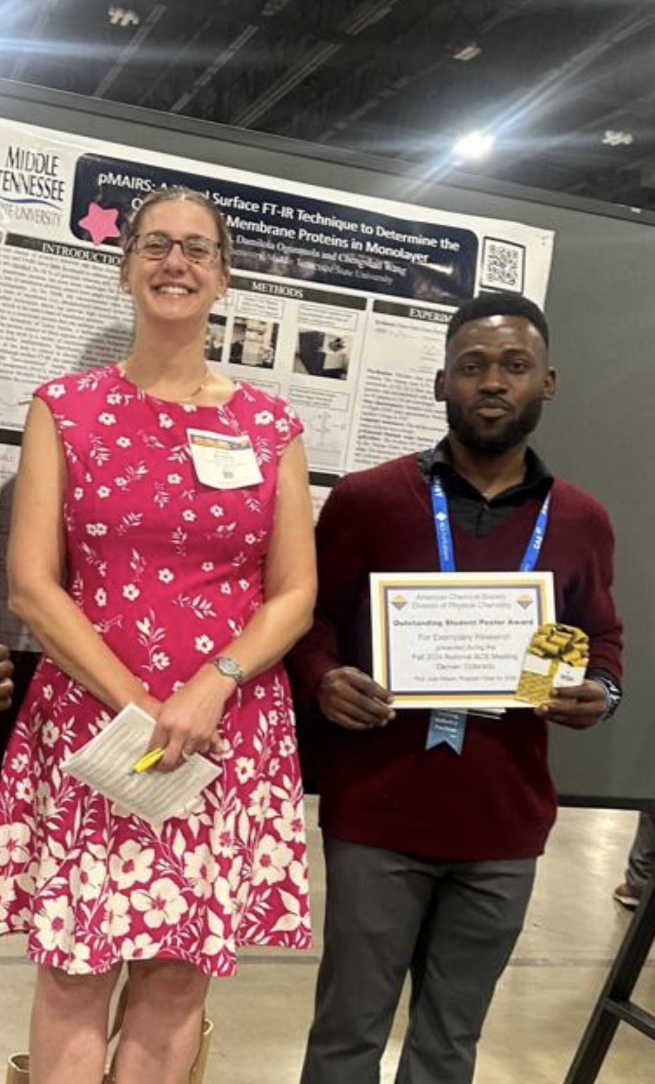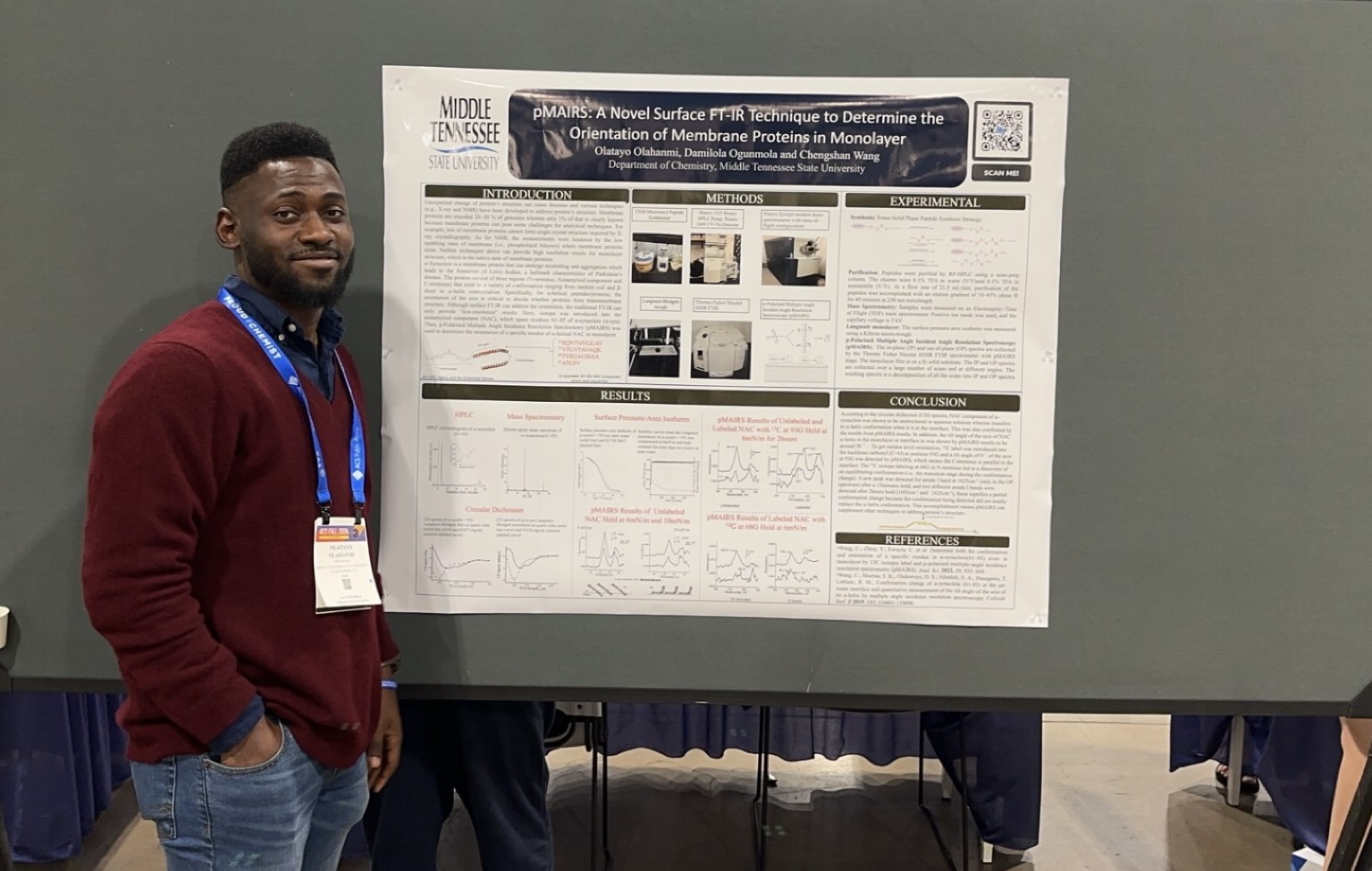In a quiet laboratory tucked inside Middle Tennessee State University (MTSU), Olatayo Adedayo Olahanmi, a Nigerian-born scientist and analytical chemist, is making waves in the world of Parkinson’s disease research with a novel method that may transform how scientists understand and ultimately treat the debilitating neurodegenerative disorder.
Armed with two master’s degrees—one in Chemical Engineering from the University of Ilorin in Nigeria and another in Chemistry from MTSU—Olahanmi is at the forefront of pioneering a technique never before used in the United States: Polarised Multiple Angle Incidence Resolution Spectroscopy (pMAIRS). His work focuses on a crucial protein, α-synuclein, known for forming toxic aggregates in the brains of Parkinson’s patients.
“My goal,” says Olahanmi, “is to unravel how this protein misbehaves at the molecular level so that we can stop it before it causes damage.”
A Global Challenge, A Local Hero
Parkinson’s disease is the second most common neurodegenerative disorder globally, affecting more than 10 million people. The key culprit is the α-synuclein protein, particularly a segment known as the Non-Amyloid-β Component (NAC), which tends to aggregate and form harmful fibrils in the brain. Olahanmi’s thesis—titled “Determine the Orientation of β-Sheet Conformation for Specific Residues in the N-Terminus of α-Syn(61–95) in Monolayers by pMAIRS”—delves into this protein segment in unprecedented detail.
Using a custom-designed synthetic version of the NAC region, Olahanmi leveraged the pMAIRS technique to observe how the protein’s conformation changes in lipid monolayers. His research demonstrated, for the first time in the U.S., that individual residues of the protein undergo distinct changes that may influence its pathogenic behaviour.
A First in the United States
What sets Olahanmi’s work apart is the application of pMAIRS to protein science, a tool typically used in materials chemistry. By innovatively adapting it to study biological macromolecules, he has opened a new frontier in membrane protein analysis.
“This is groundbreaking,” said Professor Giovani Dietler, a global leader in biophysics from the Institut de Physique in Switzerland. “Olatayo used a novel technique—never before used in the United States—to study α-synuclein. This could revolutionise our understanding of its role in Parkinson’s.”
Backed by Experts, Funded by Institutions
Olahanmi’s work has earned accolades and funding from MTSU’s College of Basic and Applied Sciences (CBAS). Under the mentorship of Dr. Chengshan Wang, he received full financial backing, including specialized reagents and access to cutting-edge facilities.
A Vision Beyond the Laboratory
Currently employed as an analytical chemist at August Bio Services, a pharmaceutical company focused on precision medicine, Olahanmi is determined to see his work impact clinical practice.
“The ultimate goal is drug development. If we can understand how the α-synuclein protein behaves before it aggregates, we can design molecules to stop it in its tracks,” Olahanmi said.
He’s already looking ahead to synthesising the full-length α-synuclein protein, examining its N- and C-terminal domains, and uncovering the molecular triggers behind its transformation into harmful forms. His approach promises to pave the way for earlier diagnosis and targeted drug therapies that can slow or reverse Parkinson’s progression.
National and International Recognition
Olahanmi’s academic journey has also included:
- ACS Outstanding Student Poster Award from the American Chemical Society (ACS)
- Invitations to present at national conferences, including ACS National Meetings and SciMeetings
- Peer review engagements for scholarly journals, highlighting his role as a trusted voice in analytical chemistry
With over 308 reads of his publications and growing citations globally—including from researchers in the U.K., U.S., Germany, Ethiopia, and Colombia—his influence continues to spread.
A Scientist with a Mission
Olahanmi remains steadfast in his vision: to apply his knowledge, creativity, and analytical prowess to solve one of the most pressing medical challenges of our time.
“Parkinson’s disease doesn’t discriminate—it affects millions worldwide. My mission is to contribute solutions not just for Americans, but for everyone.”
As the world searches for a cure, voices like Olatayo Olahanmi’s are becoming increasingly critical. With innovation, determination, and international support, his research may bring us closer to understanding—and eventually defeating—Parkinson’s disease.






